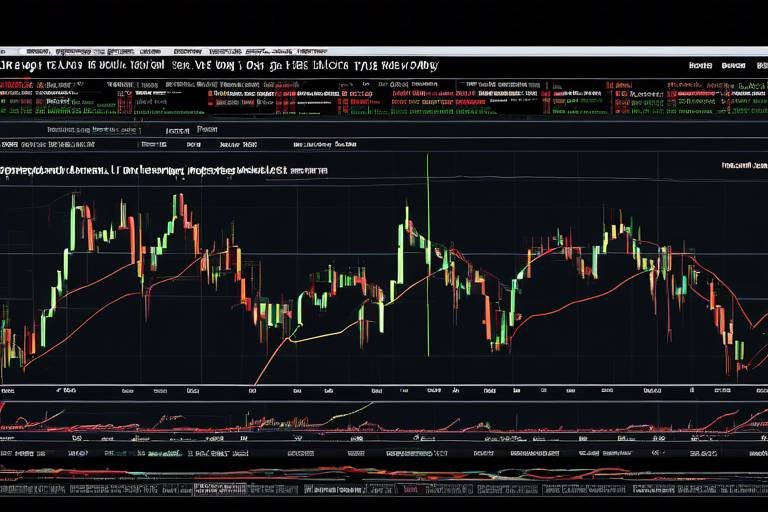Understanding the Risks of Investing in ICOs
Investing in Initial Coin Offerings (ICOs) can be an exciting venture, but it's essential to recognize that it comes with a unique set of risks. As the cryptocurrency landscape continues to evolve, the allure of high returns often overshadows the potential pitfalls. In this article, we will explore the various risks associated with ICO investments, including market volatility, regulatory challenges, and the vital importance of conducting due diligence before committing your hard-earned money.
First and foremost, let's talk about the volatility that characterizes cryptocurrency markets. Unlike traditional stocks or bonds, cryptocurrencies can experience dramatic price swings in a matter of hours—or even minutes! Imagine waking up to find that your investment has either doubled or halved in value overnight. This unpredictability is a double-edged sword; while it presents opportunities for substantial gains, it also poses significant risks for investors who may not be prepared for such fluctuations.
For instance, a sudden market crash can wipe out substantial investments, leaving investors in shock and disbelief. To navigate this treacherous terrain, it’s crucial for potential ICO investors to develop a robust risk management strategy. This may include setting stop-loss orders, diversifying investments, and staying informed about market trends. By understanding the volatile nature of cryptocurrency, you can make more informed decisions and potentially safeguard your investments.
Another critical aspect to consider is the regulatory landscape surrounding ICOs. The legal framework governing cryptocurrencies varies significantly from one country to another. Some nations have embraced ICOs, while others have imposed strict regulations or outright bans. This inconsistency can create confusion and uncertainty for investors.
Awareness of these legal challenges is essential for mitigating risks. For example, if you invest in an ICO that operates in a jurisdiction with loose regulations, you may find yourself at a higher risk of fraud or mismanagement. Conversely, investing in an ICO that adheres to stringent regulatory standards can provide a layer of security.
Regulatory changes can have a profound impact on the viability of ICO projects. A sudden announcement from a government authority can lead to market panic, affecting the value of your investments. Staying informed about legislative developments is crucial for investors. For instance, if a country decides to impose stricter regulations on ICOs, it could lead to a decline in investor confidence, resulting in lower demand for tokens.
The global regulatory landscape for ICOs is incredibly diverse. Countries like the United States and Canada have established clear guidelines, while others remain ambiguous or undeveloped. Understanding these differences is essential for investors looking to engage in international ICO opportunities. Below is a brief overview of how different countries approach ICOs:
| Country | Regulatory Approach |
|---|---|
| United States | Stringent regulations; SEC oversight |
| Switzerland | Progressive; clear guidelines |
| China | Strict ban on ICOs |
| Singapore | Supportive; regulatory sandbox |
A solid legal framework can provide security for investors. Evaluating the legal standing of an ICO is crucial in assessing its legitimacy and potential for success. Look for projects that have undergone rigorous legal scrutiny and have clear compliance measures in place. This diligence can often be the difference between a successful investment and a disastrous one.
Unfortunately, the rise of ICOs has also led to an increase in scams. Recognizing red flags and understanding how to identify fraudulent projects is vital for protecting your investments. Some common warning signs include:
- Unrealistic promises: If it sounds too good to be true, it probably is.
- Anonymity of the team: If the team behind the project is not transparent about their identities, proceed with caution.
- Poorly written whitepapers: A lack of detail or professionalism can indicate a lack of seriousness.
Conducting thorough research before investing in an ICO is paramount. Investors should evaluate the project's whitepaper, team, and market potential to make informed decisions. A well-researched investment can significantly reduce risks and enhance the likelihood of success.
A project's whitepaper is its blueprint. Understanding how to analyze this document can provide insights into the project's feasibility and the team’s vision. Look for clarity, thoroughness, and realistic projections. A well-crafted whitepaper should answer key questions about the project’s purpose, technology, and roadmap.
The credibility and experience of the team can significantly influence an ICO's success. Investors should scrutinize the backgrounds and track records of the project leaders. A strong team with a proven history in technology and finance is often a good indicator of a project's potential.
Lastly, investor sentiment and community support play a crucial role in the success of ICOs. Understanding these dynamics can help investors gauge the potential for growth and sustainability. Engaged communities often lead to increased visibility and credibility for projects.
Social media platforms are vital for ICO marketing and community building. Investors should monitor these channels to assess public perception and community engagement. An active and supportive community can be a strong indicator of a project’s potential success.
Market trends can impact ICO performance. Staying updated on industry trends and competitor movements can help investors make strategic decisions regarding their investments. A keen eye on market dynamics can often reveal hidden opportunities and potential threats.
Q: What is an ICO?
A: An Initial Coin Offering (ICO) is a fundraising mechanism where new projects sell their underlying crypto tokens in exchange for established cryptocurrencies like Bitcoin or Ethereum.
Q: Are ICOs regulated?
A: The regulatory environment for ICOs varies by country. Some countries have strict regulations, while others have a more relaxed approach.
Q: How can I avoid scams when investing in ICOs?
A: Conduct thorough research, evaluate the project's whitepaper, and assess the credibility of the team behind the ICO. Look for red flags such as unrealistic promises and anonymity.
Q: What should I consider before investing in an ICO?
A: Consider the project's viability, the team's experience, market potential, and the regulatory environment. Conducting due diligence is key to making informed investment decisions.

The Volatility of Cryptocurrency Markets
When it comes to investing in Initial Coin Offerings (ICOs), one of the most significant factors to consider is the volatility of cryptocurrency markets. Imagine riding a roller coaster; the ups and downs can be thrilling, but they can also be terrifying. This is precisely what investing in cryptocurrencies feels like. Prices can skyrocket one moment and plummet the next, creating an environment where fortunes can be made or lost in the blink of an eye.
Understanding this volatility is crucial for potential investors. It’s not just about jumping on the latest trend; it’s about being informed and prepared for rapid changes. For example, a sudden tweet from a high-profile individual can send prices soaring or crashing. Investors need to be aware of the factors that contribute to these fluctuations, such as market sentiment, technological developments, and even regulatory news.
Here are some key factors influencing the volatility of cryptocurrency markets:
- Market Sentiment: The emotions and perceptions of investors can drive prices up or down. Positive news can lead to a buying frenzy, while negative news can cause panic selling.
- Liquidity: Many cryptocurrencies have low liquidity, meaning that even small trades can significantly impact prices.
- Technological Changes: Innovations or issues within the technology behind a cryptocurrency can lead to significant price movements.
- Regulatory News: Changes in laws or regulations can create uncertainty, leading to increased volatility.
To illustrate just how volatile these markets can be, let’s take a look at a brief comparison of some popular cryptocurrencies over a recent month:
| Cryptocurrency | Price Start of Month | Price End of Month | Percentage Change |
|---|---|---|---|
| Bitcoin (BTC) | $45,000 | $50,000 | +11.11% |
| Ethereum (ETH) | $3,000 | $2,500 | -16.67% |
| Ripple (XRP) | $1.00 | $1.50 | +50.00% |
As seen in the table, the volatility can lead to drastic changes in value, making it imperative for investors to stay alert and informed. So, what’s the takeaway? If you’re considering investing in ICOs, you need to be prepared for a wild ride. It’s essential to have a strategy in place, whether that means setting stop-loss orders or diversifying your portfolio to mitigate risks.
In conclusion, while the potential for high returns in ICO investments is enticing, the volatility of cryptocurrency markets cannot be overlooked. Investors must remain vigilant, continuously educate themselves, and be ready to adapt to the ever-changing landscape of digital currencies.

Regulatory Challenges and Compliance
Investing in Initial Coin Offerings (ICOs) can be an exhilarating journey, but it also comes with a fair share of regulatory challenges that potential investors must navigate. The landscape of cryptocurrency regulations is as dynamic as the market itself, often shifting in response to new developments, technological advancements, and public sentiment. Understanding these regulations is not just a matter of compliance; it’s a vital aspect of risk management that can mean the difference between a successful investment and a costly misstep.
One of the primary regulatory challenges facing ICO investors is the **lack of uniformity** in regulations across different jurisdictions. For instance, while some countries embrace ICOs and provide clear guidelines, others impose strict restrictions or outright bans. This inconsistency can create confusion and uncertainty for investors who may not be aware of the legal implications of their investments. Therefore, it is crucial for investors to conduct thorough research on the regulatory environment of the country where the ICO is based.
Moreover, the **impact of regulatory changes** cannot be overstated. New laws or amendments to existing regulations can significantly affect the viability of an ICO. For example, if a country decides to classify certain tokens as securities, the ICO may face additional compliance requirements, which could hinder its operations. Investors should stay informed about legislative developments that may influence their investments and the overall market environment. Keeping an eye on regulatory news can help investors anticipate changes and adjust their strategies accordingly.
The regulatory framework for ICOs varies widely across countries, making it essential for investors to understand these differences. In the United States, the Securities and Exchange Commission (SEC) has taken a firm stance on regulating ICOs, considering many tokens as securities. This means that ICOs must comply with stringent disclosure and registration requirements, which can be a hurdle for many startups. Conversely, countries like Switzerland have adopted a more favorable approach, offering a clear regulatory framework that encourages innovation while protecting investors.
| Country | Regulatory Approach |
|---|---|
| United States | Strict regulations; many tokens classified as securities |
| Switzerland | Supportive framework; encourages ICOs with clear guidelines |
| China | Ban on ICOs; strict enforcement against non-compliant projects |
| Singapore | Balanced approach; clear regulations with a focus on innovation |
Understanding these differences is crucial for investors looking to engage in international ICO opportunities. The potential for profit is immense, but it is accompanied by the responsibility to comply with local laws. Ignorance is not bliss in this case; it can lead to severe penalties, including fines or even criminal charges.
A solid legal framework can provide security for investors. Evaluating the legal standing of an ICO can help assess its legitimacy and potential for success. Investors should look for projects that have clear legal opinions from reputable law firms, as this indicates that the ICO has taken steps to comply with regulations. Additionally, transparency in the project’s operations and financial disclosures can serve as a red flag or a green light for potential investments.
Ultimately, navigating the regulatory landscape requires diligence and a proactive approach. By staying informed and conducting thorough research, investors can better position themselves to make wise investment choices in the ever-evolving world of ICOs.
- What are ICOs? Initial Coin Offerings (ICOs) are fundraising mechanisms where new cryptocurrency projects sell their tokens to investors, often in exchange for established cryptocurrencies like Bitcoin or Ethereum.
- Why are regulations important for ICOs? Regulations help protect investors from fraud and ensure that ICOs operate within legal boundaries, fostering a safer investment environment.
- How can I identify a legitimate ICO? Look for clear whitepapers, transparency in operations, and a credible team behind the project. Legal opinions and compliance with local regulations are also good indicators of legitimacy.
- What should I do if an ICO is banned in my country? It is advisable to refrain from investing in such ICOs, as doing so could lead to legal consequences. Always prioritize compliance with local laws.

Impact of Regulatory Changes
The world of Initial Coin Offerings (ICOs) is not just a playground for tech enthusiasts and investors; it is also a complex arena influenced heavily by regulatory changes. The moment a new regulation is introduced or an existing one is modified, it sends ripples through the market, affecting not only the viability of specific ICO projects but also the overall sentiment of investors. Imagine navigating a ship through turbulent waters; one sudden wave can change the course entirely. This is how regulatory shifts can impact ICO investments.
For instance, when a country decides to impose strict regulations on cryptocurrency transactions, it can lead to a decline in investor confidence. This drop in confidence may result in a decrease in funding for ICOs, as potential investors might hesitate to put their money into projects that could be deemed illegal or non-compliant. Conversely, if a country adopts a more favorable regulatory stance, it can lead to a surge in investment, as the market perceives these changes as a green light for innovation and growth.
To better illustrate the impact of regulatory changes, consider the following table:
| Regulatory Change | Impact on ICOs | Investor Sentiment |
|---|---|---|
| Introduction of strict KYC/AML laws | Increased compliance costs for ICOs | Negative; investors may pull back |
| Legal recognition of cryptocurrencies | Boost in market confidence | Positive; increased investments |
| Ban on ICOs in a major economy | Market downturn for ICOs | Very negative; panic selling |
It's essential for investors to stay informed about these regulatory landscapes, not just in their own countries but globally. Each jurisdiction has its own set of rules that can affect the legitimacy and operational capabilities of ICOs. For example, while the European Union may have a more structured approach to regulating ICOs, other regions might still be in a state of flux, creating uncertainty for investors looking to diversify internationally.
Furthermore, the importance of compliance cannot be overstated. ICOs that fail to adhere to regulations may find themselves facing legal challenges, which can lead to project shutdowns and significant financial losses for investors. Staying abreast of these changes allows investors to make informed decisions, helping them to either capitalize on opportunities or avoid potential pitfalls.
In summary, the impact of regulatory changes on ICOs is profound and multifaceted. Investors must not only be aware of current regulations but also anticipate future changes that could affect their investments. Just as a seasoned sailor keeps a close eye on the weather, savvy investors should monitor regulatory developments to navigate the sometimes stormy seas of the cryptocurrency market successfully.
- What are ICOs? Initial Coin Offerings (ICOs) are fundraising mechanisms where new cryptocurrencies sell their tokens in exchange for established cryptocurrencies like Bitcoin or Ethereum.
- Why are regulations important for ICOs? Regulations help protect investors from fraud, ensure compliance with financial laws, and create a stable investment environment.
- How can I stay updated on regulatory changes? Following cryptocurrency news outlets, joining online forums, and subscribing to regulatory body updates can help keep you informed.
- What should I do if I suspect an ICO is fraudulent? Conduct thorough research, consult with experts, and report any suspicious activities to the relevant authorities.

Global Regulatory Landscape
The global regulatory landscape for Initial Coin Offerings (ICOs) is as diverse and complex as the cryptocurrency markets themselves. Each country has its own approach, which can range from outright bans to full-fledged support and regulation. This patchwork of regulations creates a challenging environment for investors who are eager to participate in ICOs. One moment, a project may seem promising in one jurisdiction, and the next, it could be facing legal hurdles due to new regulations in another. Understanding these differences is essential for anyone looking to invest in ICOs.
For instance, in the United States, the Securities and Exchange Commission (SEC) has taken a stringent stance on ICOs, classifying many tokens as securities. This means that projects must comply with a host of regulations, including registration requirements and disclosure obligations. On the flip side, countries like Switzerland have adopted a more welcoming approach, creating a regulatory framework that encourages innovation while still providing necessary protections for investors.
Here’s a quick overview of how different regions approach ICO regulations:
| Region | Regulatory Approach | Key Regulatory Body |
|---|---|---|
| United States | Strict, many tokens classified as securities | SEC |
| European Union | Varied; some countries are strict, others lenient | ESMA |
| Switzerland | Supportive, clear guidelines for ICOs | FINMA |
| China | Ban on ICOs and cryptocurrency exchanges | N/A |
| Singapore | Friendly, requires registration for certain tokens | MAS |
As you can see, the regulatory environment can significantly influence the success of an ICO. Investors must stay informed about the legal implications in their own countries as well as in the countries where the ICO is based. This knowledge not only helps in making informed investment decisions but also in understanding the potential risks involved.
Furthermore, the importance of a solid legal framework cannot be overstated. A well-defined set of regulations can provide a safety net for investors, ensuring that their rights are protected and that there are mechanisms in place to address grievances. When evaluating an ICO, it’s crucial to consider the legal standing of the project and its compliance with local laws.
In conclusion, navigating the global regulatory landscape requires diligence and a proactive approach. By staying informed and understanding the nuances of different jurisdictions, investors can mitigate risks and make more educated decisions regarding their ICO investments.
- What is an ICO? An Initial Coin Offering (ICO) is a fundraising method where new projects sell their underlying crypto tokens in exchange for established cryptocurrencies like Bitcoin or Ethereum.
- Are ICOs legal? The legality of ICOs varies by country. Some countries have embraced them, while others have imposed strict regulations or outright bans.
- How do I know if an ICO is legitimate? Conduct thorough due diligence, including reviewing the project's whitepaper, assessing the team behind the project, and checking for any red flags.
- What are the risks of investing in ICOs? Risks include market volatility, potential regulatory changes, and the possibility of scams or fraudulent projects.

Importance of Legal Frameworks
When it comes to investing in Initial Coin Offerings (ICOs), the importance of a solid legal framework cannot be overstated. Imagine embarking on a thrilling adventure without a map; that's what investing in an ICO without understanding its legal standing feels like. Legal frameworks serve as the foundation that can either support or crumble the entire structure of an ICO project. A well-defined legal environment not only protects investors but also enhances the legitimacy of the ICO itself.
Investors need to recognize that the absence of a robust legal framework can open the door to numerous risks. In many cases, ICOs operate in a gray area of regulation, which can lead to uncertainty. For instance, if an ICO lacks clear compliance with local laws, it may face legal repercussions that could jeopardize its operations and, consequently, the investments made by individuals like you. This is why understanding the legal landscape is vital.
To navigate this complex terrain, investors should consider several key factors:
- Compliance with Local Laws: Each country has its own set of regulations that govern ICOs. Familiarizing yourself with these laws can help you avoid potential pitfalls.
- Transparency: A legitimate ICO should provide clear and accessible information about its legal standing. This includes documentation related to its registration and compliance with financial regulations.
- Investor Protections: A solid legal framework often includes measures that protect investors from fraud and mismanagement, ensuring that their funds are safeguarded.
In addition, the legal framework can significantly influence the trustworthiness of an ICO. Projects that operate under well-established legal guidelines tend to attract more serious investors, which can lead to higher levels of funding and a greater chance of success. In contrast, ICOs that lack legal clarity often struggle to gain traction, as potential investors may be wary of putting their money into a project that could be deemed illegal or fraudulent.
Furthermore, the presence of a strong legal framework can enhance the overall reputation of the cryptocurrency market. As more ICOs adhere to regulations and best practices, the market can evolve into a more trustworthy environment for all participants. This, in turn, can foster greater public interest and investment in cryptocurrencies, leading to a more vibrant and sustainable ecosystem.
In conclusion, understanding the importance of legal frameworks in the ICO landscape is essential for any investor looking to navigate this exciting yet risky space. By doing your due diligence and ensuring that the ICO you are considering operates within a solid legal framework, you can significantly reduce your investment risks and enhance your chances of success.
1. Why is a legal framework important for ICOs?
A legal framework provides structure and guidelines that protect investors and ensure compliance with regulations, reducing the risk of fraud and mismanagement.
2. How can I assess the legal standing of an ICO?
You can evaluate the ICO’s whitepaper, check for legal registrations, and review any disclosures regarding compliance with local laws.
3. What are the consequences of investing in an ICO without a legal framework?
Investing in an ICO without a legal framework can lead to potential losses, legal issues, and a lack of recourse if the project fails or is fraudulent.
4. Are all ICOs required to follow the same legal guidelines?
No, legal requirements vary by country. It’s important to understand the specific regulations that apply to the ICO in question.

Common Scams and Fraudulent ICOs
In the exhilarating world of Initial Coin Offerings (ICOs), the potential for profit is often accompanied by a shadowy underbelly of scams and fraudulent schemes. As an investor, it’s crucial to be aware of the pitfalls that can lead to devastating losses. Just like a wolf in sheep's clothing, these scams can often appear legitimate at first glance, making it essential for you to develop a keen eye for red flags.
One of the most common types of scams is the “Pump and Dump” scheme. In this scenario, fraudsters artificially inflate the price of a cryptocurrency by spreading false information, enticing unsuspecting investors to buy in. Once the price peaks, the scammers sell off their holdings, leaving other investors holding worthless coins. It’s akin to a magician pulling a rabbit out of a hat—what seems magical is often just a clever trick.
Another prevalent scam is the “Exit Scam”, where the creators of an ICO disappear with the funds raised, leaving investors high and dry. This can happen after a successful fundraising campaign, where the project seems promising, but the developers vanish into thin air once they’ve collected enough money. To avoid falling victim to such schemes, it’s imperative to conduct thorough research on the team behind the ICO and their previous projects.
Moreover, there are copycat ICOs that mimic successful projects to deceive investors. These clones often use similar branding and names to confuse potential backers. For instance, if a popular ICO is making waves, a fraudulent project might launch with a name that closely resembles it, hoping to ride on its coattails. Always verify the official channels and websites to ensure you’re investing in the right project.
To help you identify these scams, here are some common red flags to watch out for:
- Unrealistic Promises: If it sounds too good to be true, it probably is. Be wary of projects promising guaranteed returns or overnight wealth.
- Poorly Written Whitepapers: A lack of detail or clarity in the project’s whitepaper can indicate a lack of seriousness or expertise.
- Anonymous Teams: If the team behind the ICO is not transparent about their identities or backgrounds, it’s a major red flag.
- Pressure Tactics: Scammers often create a sense of urgency, pushing you to invest quickly without doing proper research.
Understanding these common scams can significantly enhance your ability to navigate the ICO landscape safely. Always remember that due diligence is your best friend in this volatile market. The more informed you are, the better equipped you'll be to make sound investment decisions.
What is an ICO?
An Initial Coin Offering (ICO) is a fundraising mechanism where new cryptocurrency projects sell their tokens to investors in exchange for established cryptocurrencies like Bitcoin or Ethereum.
How can I identify a fraudulent ICO?
Look for red flags such as unrealistic promises, poorly written whitepapers, anonymous teams, and pressure tactics. Conduct thorough research before investing.
Are all ICOs scams?
No, not all ICOs are scams. Many legitimate projects offer valuable services or products. However, due diligence is essential to differentiate between the good and the bad.
What should I do if I fall victim to an ICO scam?
If you believe you have been scammed, report it to the relevant authorities and consider seeking legal advice. Unfortunately, recovering lost funds can be challenging.

Due Diligence and Research
When it comes to investing in Initial Coin Offerings (ICOs), the phrase "knowledge is power" couldn't be more accurate. Conducting thorough due diligence and research is not just a good practice; it’s a necessity. Imagine you're about to dive into a pool. Would you leap in without checking the water depth? Of course not! The same principle applies to ICO investments. Before you commit your hard-earned money, you need to ensure that you understand what you're getting into.
First and foremost, the project's whitepaper serves as the roadmap for any ICO. This document outlines the project's goals, technology, and the team behind it. A well-crafted whitepaper should clearly explain the problem the project aims to solve, the proposed solution, and how the funds will be utilized. Look for clarity, transparency, and a realistic timeline. If the whitepaper is filled with jargon and vague promises, it's a major red flag. It’s like trying to read a recipe that skips half the ingredients and instructions—confusing and risky!
Next, take a closer look at the team behind the ICO. The credibility and experience of the project leaders can significantly influence the success of the ICO. A strong team often brings a wealth of knowledge and a proven track record in relevant fields. Investigate their backgrounds, LinkedIn profiles, and previous projects. Have they successfully launched other cryptocurrencies or tech startups? Understanding their history can give you insight into the project's potential. It’s like choosing a guide for an adventurous hike; you want someone who knows the terrain and has successfully led others before.
Furthermore, don’t underestimate the importance of community engagement. A vibrant, active community can be a strong indicator of a project's potential success. Check out forums, social media platforms, and community chats. Are people excited and engaged? Are there regular updates and discussions? A supportive community can help propel a project forward, while a silent one might indicate trouble ahead. It’s like attending a concert; the energy of the crowd can enhance the experience, or a lack of enthusiasm can make it feel flat.
Lastly, it’s crucial to stay updated on the market sentiment surrounding the ICO. This involves monitoring reviews, news articles, and market trends. Investor sentiment can shift rapidly, influenced by market conditions or news events. Use tools like Google Alerts or social media monitoring to keep your finger on the pulse. If the buzz is positive and the project is gaining traction, it could be a good sign. However, if you notice a lot of negative feedback or skepticism, it might be wise to reconsider your investment.
In summary, conducting thorough due diligence and research is your best defense against the risks associated with ICO investments. By analyzing the whitepaper, assessing the team, engaging with the community, and keeping an eye on market sentiment, you can make more informed decisions. Remember, investing in ICOs is not just about jumping on the latest trend; it’s about making strategic choices that align with your financial goals.
- What is due diligence in ICO investing?
Due diligence in ICO investing refers to the comprehensive research and analysis investors conduct to evaluate the viability and legitimacy of a project before committing funds. - How can I assess the credibility of an ICO team?
Investigate the team's backgrounds, previous projects, and their professional experiences to gauge their credibility and capability to execute the project. - Why is the community important for an ICO?
A strong community can indicate a project's potential for success, as engaged investors often contribute to marketing and support, driving the project forward. - What should I look for in a whitepaper?
A good whitepaper should clearly outline the project's goals, technology, team, funding usage, and provide a realistic timeline for development.

Evaluating Project Whitepapers
When it comes to investing in Initial Coin Offerings (ICOs), the project whitepaper is your first and arguably most crucial point of reference. Think of the whitepaper as the blueprint for the entire project. It outlines the project's vision, goals, and the technology behind it. Just like you wouldn’t buy a house without checking the blueprints, you shouldn't invest in an ICO without thoroughly analyzing its whitepaper.
A well-crafted whitepaper should provide a comprehensive overview of the project, covering key aspects such as the problem it aims to solve, the proposed solution, and the technical details that support its feasibility. You should look for clarity and depth in the content. If a whitepaper is filled with jargon and lacks clear explanations, it could be a red flag. Investors should ask themselves: Is this project truly innovative, or is it just riding the coattails of existing technologies?
Here are some critical components to focus on when evaluating a project whitepaper:
- Problem Statement: Does the project clearly articulate the problem it intends to solve? A compelling problem statement is essential for understanding the project's relevance.
- Proposed Solution: Is the proposed solution feasible and innovative? Look for unique approaches that set the project apart from others.
- Technical Details: Are the technical aspects well-explained? A solid whitepaper should include information about the underlying technology and how it works.
- Tokenomics: Does the whitepaper explain the token distribution model? Understanding how tokens will be allocated and used is vital for assessing potential value.
- Roadmap: Is there a clear roadmap outlining the project's milestones? A well-defined timeline can indicate the team's commitment and planning capabilities.
In addition to these components, consider the overall presentation of the whitepaper. A professional layout, free from grammatical errors and inconsistencies, reflects the seriousness of the project. If the document looks rushed or poorly constructed, it may suggest a lack of attention to detail that could extend to the project itself.
Lastly, it’s essential to cross-reference the information in the whitepaper with external sources. Are there credible endorsements or partnerships mentioned? Have other reputable platforms reviewed the project? This additional research can provide insights into the project's legitimacy and potential for success.
What is a whitepaper in the context of ICOs?
A whitepaper is a detailed document that outlines the goals, technology, and roadmap of an ICO project. It serves as a guide for potential investors to understand the project better.
How do I know if a whitepaper is credible?
Look for clear, detailed information that is well-organized and professionally presented. Also, check for external validation from reputable sources.
What should I do if the whitepaper is unclear?
If you find the whitepaper confusing or lacking in detail, it may be a sign to proceed with caution. Consider reaching out to the project team for clarification or looking for alternative investments.

Assessing the Team Behind the ICO
When it comes to investing in Initial Coin Offerings (ICOs), one of the most critical factors to evaluate is the team behind the project. The team’s credibility and experience can often be the difference between a successful ICO and one that fades into obscurity. Imagine embarking on a journey without a reliable captain; the risks are heightened. Similarly, investing in an ICO led by an inexperienced or untrustworthy team can lead to disastrous outcomes.
First and foremost, you should look into the backgrounds of the team members. Are they seasoned professionals in the blockchain space? Do they have a history of successful project launches? A team with a robust track record in technology, finance, or entrepreneurship can be a good indicator of potential success. For example, if a project’s lead developer has previously worked on notable blockchain projects, that’s a positive sign. Conversely, if the team consists of individuals with no relevant experience, you might want to tread carefully.
Moreover, assess the diversity of skills within the team. A well-rounded team should include not only developers but also marketing experts, financial analysts, and legal advisors. This diversity ensures that all aspects of the project are covered, from technical development to regulatory compliance. You wouldn’t want a ship crewed only by sailors; you’d need navigators, engineers, and cooks too! Each member plays a vital role in steering the project toward success.
Another aspect to consider is the transparency of the team. Are they open about their identities and qualifications? Teams that hide behind pseudonyms or lack a visible online presence could be a red flag. Look for team members who actively engage with the community on social media platforms and are willing to answer questions. Transparency fosters trust, and trust is crucial in the world of ICOs.
Lastly, check for any partnerships or endorsements the team may have secured. Collaborations with reputable companies or endorsements from recognized figures in the crypto space can lend credibility to the project. For instance, if a well-known blockchain organization backs the ICO, it can significantly enhance the project's legitimacy. However, be cautious and ensure that these partnerships are genuine and not just for show.
In summary, assessing the team behind an ICO is not just a box to tick off; it’s a fundamental step in your investment journey. By scrutinizing their backgrounds, skills, transparency, and partnerships, you can better gauge the potential for success. Remember, a strong team can turn a mediocre idea into a groundbreaking project, while a weak team can sink even the most promising concept.
- What should I look for in an ICO team? Look for team members with relevant experience, a diverse skill set, transparency, and credible partnerships.
- How can I verify a team's background? Research their LinkedIn profiles, past projects, and any public engagements they have participated in.
- Are anonymous teams a red flag? Yes, a lack of transparency can be concerning. Always prefer teams that are open about their identities.
- Why are partnerships important? Partnerships with reputable organizations can enhance the credibility of an ICO and indicate potential for success.

Market Sentiment and Community Engagement
In the world of Initial Coin Offerings (ICOs), market sentiment and community engagement are like the wind beneath the wings of a soaring bird. They can lift a project to new heights or bring it crashing down. Investors often overlook the importance of these factors, but they are crucial for gauging the potential success of any ICO. So, what exactly do we mean by market sentiment? It's the collective attitude of investors towards a particular cryptocurrency or ICO, which can be influenced by a myriad of factors, including news, social media buzz, and overall market trends.
One of the most significant aspects of market sentiment is how it can create a self-fulfilling prophecy. If a large number of investors believe that an ICO will succeed, they are likely to invest, which can drive up the price and attract even more attention. Conversely, if sentiment turns negative, even the most promising projects can struggle to gain traction. This is where community engagement comes into play. A vibrant, supportive community can help bolster positive sentiment and provide the necessary momentum for an ICO to thrive.
Social media platforms play a pivotal role in shaping market sentiment and fostering community engagement. For instance, platforms like Twitter, Reddit, and Telegram serve as hotbeds for discussions, updates, and feedback about ICOs. Investors should actively monitor these channels to gauge public perception and assess how engaged the community is. A project that consistently communicates with its supporters and listens to their feedback is more likely to succeed than one that remains silent.
Moreover, community engagement can manifest in various forms, from organized meetups and webinars to online forums and social media groups. These interactions not only help investors feel more connected to the project but also provide valuable insights into the project's development and roadmap. When a community is engaged, it creates a sense of ownership and loyalty among its members, which can be a powerful driver of success.
To illustrate the significance of community engagement, consider the following table that highlights key factors influencing market sentiment:
| Factor | Description |
|---|---|
| Social Media Buzz | The level of discussion and excitement on platforms like Twitter and Reddit. |
| Community Events | Meetups, webinars, and other events that foster interaction among investors. |
| Project Transparency | How openly the project team communicates updates and responds to community concerns. |
| Market News | News articles and reports that can sway investor opinion and sentiment. |
In conclusion, understanding market sentiment and fostering community engagement are vital components for anyone considering investing in an ICO. By staying attuned to the dynamics of investor sentiment and actively participating in community discussions, investors can make more informed decisions and potentially increase their chances of success in the ever-evolving cryptocurrency landscape.
- What is market sentiment in the context of ICOs? Market sentiment refers to the overall attitude of investors towards a specific ICO, influenced by various factors such as news, social media, and market trends.
- How can I assess community engagement for an ICO? Monitor social media platforms, participate in online discussions, and look for community events to gauge the level of engagement.
- Why is community engagement important for ICO success? A strong, engaged community can enhance positive sentiment, provide feedback, and create a sense of loyalty, all of which contribute to an ICO's success.
- What role does social media play in ICOs? Social media is crucial for marketing, community building, and shaping public perception of an ICO.

Role of Social Media in ICOs
In today's digital age, social media has become a powerful tool that significantly influences the success and visibility of Initial Coin Offerings (ICOs). Just think about it: when you hear about a new ICO, what’s the first thing you do? You probably hop onto Twitter, Reddit, or Telegram to see what the buzz is all about. This immediate access to information allows potential investors to gauge the sentiment surrounding a project before they even consider putting their money down.
Social media platforms serve as the lifeblood for ICO marketing and community engagement. They provide a space where developers can share updates, answer questions, and build a loyal following. It’s like a virtual town square where everyone gathers to discuss the latest innovations in the cryptocurrency space. For instance, platforms such as Twitter and Telegram are often used for real-time communication, where project teams can interact directly with their audience. This level of engagement fosters a sense of community, which is crucial for the long-term success of any ICO.
Moreover, the role of influencers cannot be overstated. Many ICOs collaborate with well-known figures in the cryptocurrency space to amplify their reach. When a respected influencer tweets about an ICO, it can lead to a surge in interest and investment. However, this can also be a double-edged sword, as it raises the stakes for both investors and developers. Investors must be cautious and not just follow the crowd; they should conduct their own research to validate any claims made by influencers.
Another critical aspect of social media in ICOs is its ability to serve as a platform for feedback and transparency. Investors can express their concerns or questions, and project teams can address these in real-time. This transparency builds trust, which is essential in an industry often plagued by skepticism and fraud. A transparent ICO that actively engages with its community can create a positive feedback loop, where satisfied investors become advocates, further promoting the project.
However, it's essential to recognize that social media can also be a breeding ground for misinformation and hype. With so many voices chiming in, it can be challenging for investors to distinguish between genuine insights and baseless speculation. Therefore, it's crucial for potential investors to approach social media with a critical eye. They should look for verified accounts, cross-reference information, and be wary of any project that seems too good to be true.
In summary, the role of social media in ICOs is multifaceted. It provides a platform for marketing, community building, and real-time communication, but it also requires investors to be vigilant and discerning. As the landscape of ICOs continues to evolve, the impact of social media will likely grow, making it an indispensable tool for both investors and developers alike.
- What is an ICO? An Initial Coin Offering (ICO) is a fundraising method where new projects sell their underlying crypto tokens in exchange for capital.
- How can I identify a legitimate ICO? Look for a well-written whitepaper, a credible team, and active community engagement on social media.
- What are the risks associated with investing in ICOs? Risks include market volatility, regulatory challenges, and potential scams.
- Why is social media important for ICOs? It helps in marketing, community engagement, and provides real-time feedback, which builds trust.

Influence of Market Trends
The world of cryptocurrency is like a wild roller coaster, with its twists, turns, and unexpected drops. Market trends are the tracks that guide this ride, and understanding how they influence ICO performance is crucial for any investor. When you think about it, trends can be compared to the weather; they can change suddenly and dramatically, impacting everything in their path. Just as you wouldn’t go out without checking the forecast, you shouldn't dive into an ICO without considering the prevailing market trends.
One of the most significant factors that can affect ICOs is the overall sentiment in the cryptocurrency market. When the market is bullish, meaning prices are rising and investor confidence is high, ICOs often see increased interest and funding. Conversely, in a bearish market, where prices are falling and fear is rampant, even the most promising ICOs can struggle to attract investors. This highlights the importance of timing; investing during a bullish phase can lead to substantial returns, while entering during a downturn might result in losses.
Moreover, trends in technology and innovation within the blockchain space can also sway investor interest. For example, the rise of decentralized finance (DeFi) and non-fungible tokens (NFTs) has created a surge in ICOs related to these areas. Investors are often drawn to projects that align with the latest technological advancements, as these are perceived to have greater potential for growth. Keeping an eye on what’s hot in the crypto world can provide valuable insights into which ICOs might be worth considering.
Another critical aspect to consider is the competitive landscape. The success of an ICO can be heavily influenced by the performance of similar projects. If a competitor launches a groundbreaking product or secures a significant partnership, it can overshadow other ICOs, making them less appealing to potential investors. Therefore, staying updated on industry trends and competitor movements is essential for making strategic investment decisions.
In addition to these factors, social media plays a pivotal role in shaping market trends. Platforms like Twitter, Reddit, and Telegram are buzzing with discussions about new ICOs, upcoming projects, and market predictions. Investors should actively engage with these communities to gauge public sentiment and identify potential investment opportunities. The buzz around a project can often be a leading indicator of its success or failure, making it vital to pay attention to the chatter.
In conclusion, understanding the influence of market trends on ICOs is not just about following the numbers; it’s about grasping the broader narrative of the cryptocurrency landscape. By keeping an eye on market sentiment, technological advancements, competitive dynamics, and social media discussions, investors can make more informed decisions and potentially increase their chances of success in this volatile but thrilling market.
- What are the main factors influencing ICO performance? The main factors include market sentiment, technological advancements, competitive landscape, and social media trends.
- How can I stay informed about market trends? You can follow cryptocurrency news websites, social media platforms, and engage with online communities to stay updated.
- Why is timing important in ICO investments? Timing can significantly affect your returns; investing during bullish markets often leads to better outcomes compared to bearish periods.
- What role does social media play in ICO success? Social media can shape public perception and investor interest, making it crucial for gauging the potential success of an ICO.
Frequently Asked Questions
- What are ICOs and how do they work?
Initial Coin Offerings (ICOs) are a fundraising method used by startups to raise capital by issuing new cryptocurrencies or tokens. Investors buy these tokens, often in exchange for established cryptocurrencies like Bitcoin or Ethereum, hoping that their value will increase as the project develops. It's like getting a ticket to a concert before the band becomes famous; you’re betting on their future success!
- What risks are associated with investing in ICOs?
Investing in ICOs comes with several risks, including market volatility, regulatory challenges, and the potential for scams. The cryptocurrency market is known for its price swings, which can make your investment feel like a rollercoaster ride. Additionally, without proper regulations, some projects may not be legitimate, leading to potential losses.
- How can I identify a legitimate ICO?
To identify a legitimate ICO, conduct thorough due diligence. Start by reading the project's whitepaper to understand its goals and technology. Check the backgrounds of the team members involved; their experience and credibility can be indicators of the project's potential success. Also, monitor community engagement on social media to gauge public sentiment.
- What should I look for in a project's whitepaper?
A project's whitepaper should clearly outline its objectives, technology, and market potential. Look for detailed explanations of the problem the project aims to solve and how its solution stands out. Additionally, check for transparency regarding token distribution and any planned future developments.
- How do regulatory changes affect ICOs?
Regulatory changes can have a major impact on ICOs, affecting their legality and the way they operate. For instance, stricter regulations might require ICOs to register with authorities, which can limit their ability to raise funds. Staying informed about global regulatory trends is essential for making sound investment decisions.
- What are some common scams to watch out for in ICOs?
Common scams include fake ICOs that promise unrealistic returns, phishing schemes targeting investors, and projects that lack a transparent roadmap. Always be cautious of projects that rush their fundraising or fail to provide clear information. If it sounds too good to be true, it probably is!
- Why is community engagement important in ICOs?
Community engagement is crucial because it reflects the interest and support for the project. A strong, active community can drive demand for the tokens and contribute to the project's success. Engaging with the community on social media platforms can also provide insights into investor sentiment and potential challenges the project may face.
- How can I stay updated on market trends affecting ICOs?
To stay updated on market trends, follow industry news through reputable cryptocurrency websites, subscribe to newsletters, and join forums or discussion groups. Social media platforms like Twitter and Reddit are also great for real-time updates and community discussions about the latest developments in the ICO space.



















